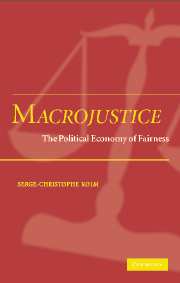Book contents
- Frontmatter
- Contents
- Presentation
- PART ONE BASES: CONSENSUS, FREEDOMS, AND CAPACITIES
- PART TWO OVERALL DISTRIBUTIVE JUSTICE: ELIE (EQUAL LABOUR INCOME EQUALIZATION)
- PART THREE COMPARISONS WITH POLICIES AND PHILOSOPHIES
- 14 Comparisons: General issues
- 15 Comparison with distributive schemes
- 16 Comparison with philosophies
- PART FOUR THE DEGREE OF COMMUNITY, EQUALITY, RECIPROCITY, AND SOLIDARITY
- PART FIVE COMPARISON WITH ECONOMICS' SOCIAL ETHICS
- References and bibliography
- Index
15 - Comparison with distributive schemes
Published online by Cambridge University Press: 31 July 2009
- Frontmatter
- Contents
- Presentation
- PART ONE BASES: CONSENSUS, FREEDOMS, AND CAPACITIES
- PART TWO OVERALL DISTRIBUTIVE JUSTICE: ELIE (EQUAL LABOUR INCOME EQUALIZATION)
- PART THREE COMPARISONS WITH POLICIES AND PHILOSOPHIES
- 14 Comparisons: General issues
- 15 Comparison with distributive schemes
- 16 Comparison with philosophies
- PART FOUR THE DEGREE OF COMMUNITY, EQUALITY, RECIPROCITY, AND SOLIDARITY
- PART FIVE COMPARISON WITH ECONOMICS' SOCIAL ETHICS
- References and bibliography
- Index
Summary
INTRODUCTION
ELIE results from a philosophy but ends up with a specific practical and simple distributive scheme. It can thus be compared not only with philosophies of social ethics and justice, but also with the specific distributive schemes that are applied or proposed. Chapter 14 noted these schemes, the relevant issues of the comparison, and the corresponding properties of ELIE. Taxation based on income has been considered in Chapter 11, and in Chapter 10 for the theory of the “welfarist optimum income taxation” because of its particular stand concerning information. The focus will now be on schemes of assistance, guaranteed minimum income, “negative income tax” or “income tax credit,” and “universal allocation” or “basic income,” along with ELIE. These schemes are first introduced in considering the rationales that led to them (Section 2). We then consider and compare the issues of financing, efficiency and incentives, freedom and dignity, information and realization, and comprehensiveness (Sections 3 to 7). The structural properties of the schemes will then be shown and compared (Section 8). Finally, the various relevant aspects of each scheme will be summarized (Section 9). ELIE will sometimes be considered for the case of unidimensional labour and proportional earnings (fixed wage rates), where it becomes EDIE(equal duration income equalization – see Chapters 8 and 9).
RATIONALES
ELIE, whose structure results from consensus and social and basic freedoms, manifests rights in society's resources (more specifically, its human resources). Its direct rationale is not the satisfaction of needs.
- Type
- Chapter
- Information
- MacrojusticeThe Political Economy of Fairness, pp. 233 - 243Publisher: Cambridge University PressPrint publication year: 2004



